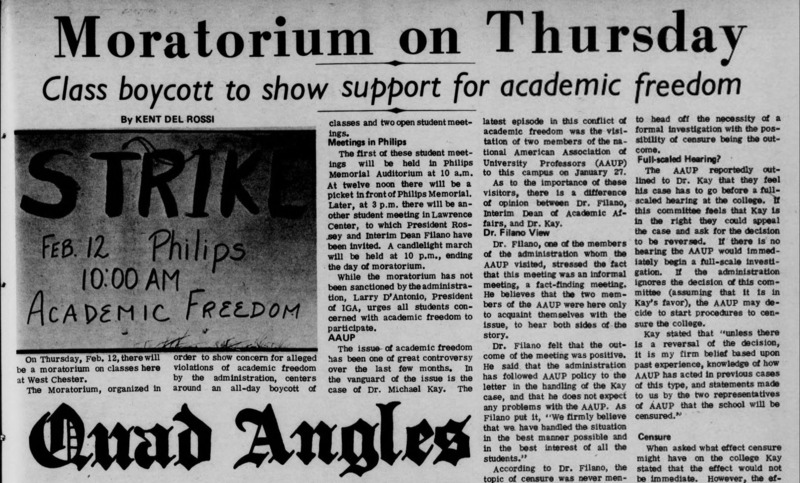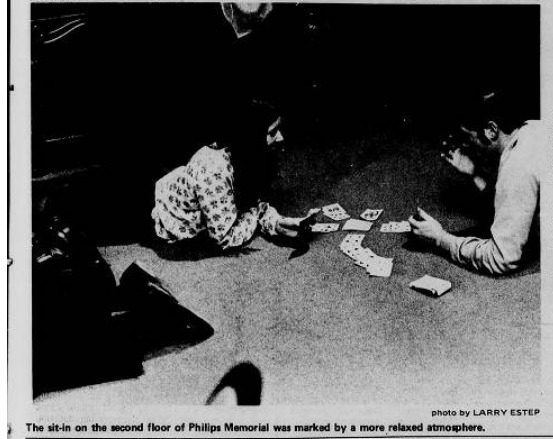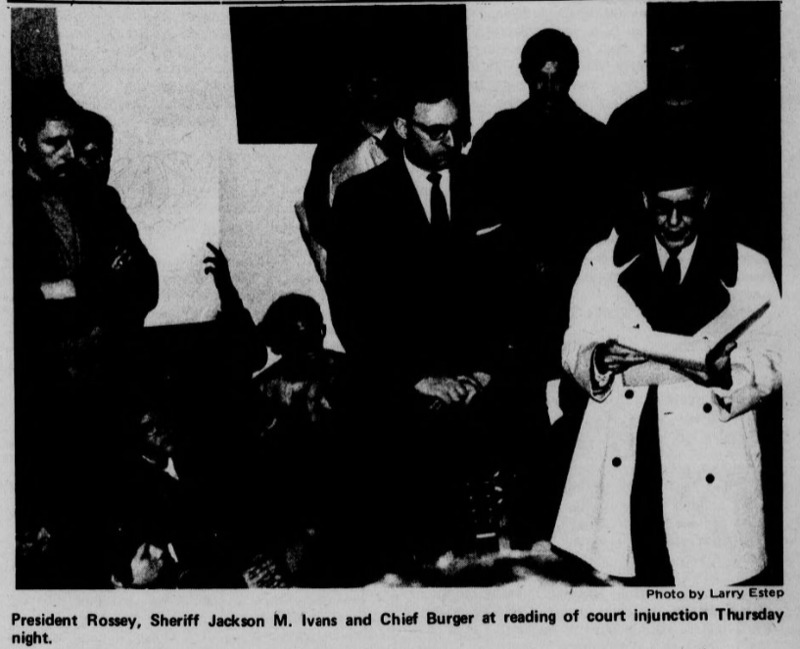Faculty and Administration Tensions During the Vietnam War
By Julien Levesque
While the U.S. government sent thousands of young Americans to fight in the jungles of South Vietnam, a different type of war unfolded domestically. During the Vietnam War era, universities became a battleground over differing ideologies. The student anti-war movement is relatively well known, but a lesser known story is the conflict that took place between college faculty and administrators across the country. West Chester University, then called West Chester State College (WCSC), was among the schools at which the administration and Board of Trustees repressed faculty perspectives. When the Board of Trustees appointed President Paul W. Rossey in 1969 it became evident that there was a divide, pinning some vocal faculty and students against the administration as WCSC considered its identity and the future of the school.
By the time Rossey first came to WCSC, students and faculty had already accused the Board of Trustees of abusing its power and their academic freedom. Rossey admitted as much and vowed that the Board would not overstep their bounds again. Ironically, the process that led to Rossey obtaining his position of college president was rumored to be a product of the Board’s abuse of power. At the beginning of the 1969 school year, a group of freshman students attended an Intercollegiate Governmental Association (IGA) meeting and left feeling disillusioned towards the administration and Rossey. Rossey and the Board did not give an opportunity for students to ask questions, leaving the students feeling unheard. The strife between administration and the students and faculty escalated when on December 4, 1969, the administration fired history professor Dr. Michael Kay without any clear reasoning.
Kay was a liberal and radical professor who spoke out in support of the anti-war effort. This ideology directly contrasted with the Board of Trustees, President Rossey, the chief of campus police and West Chester borough police. Following Rossey’s firing of Kay and a few other outspoken left-leaning professors, the American Association of University Professors (AAUP) launched an investigation into whether the administration's actions were “conducive to academic freedom.” Before the official investigation launched, members of AAUP traveled to West Chester to dig deeper into the situation developing at the school. Members of the faculty feared that the AAUP investigation might result in censure by the organization. Simultaneously, dean of faculty Dr. Albert Filano refused to acknowledge that AAUP censure was possible, as the case regarding Michael Kay was closed.
On February 12, 1970, students and faculty organized a moratorium in support of Kay and against infringements of academic freedom. Protesting students confronted Rossey, following him to his office, resulting in a sit-in that led to a verbal confrontation with Rossey. Soon, state police arrived. The students dispersed peacefully, but returned due to Rossey filing a court injunction. Larry D’Antonio, a student leader of the IGA and protests, stated that “we have no intention of resisting the injunction we are just saying that we openly defy this administration.” The following week, Rossey held a meeting with the faculty to discuss the moratorium and the state of affairs in general. In this talk he claimed that “imports” to the campus instigated the protests, and that they got out of hand due to a “strong national conspiracy” he claimed to be aware of. He instructed the faculty to “avoid any attempt to form groups among us that may tend to polarize our faculty and student body” and declared that “we will not let ourselves to generate into a Berkley, or into a Columbia.” While Rossey worried about national conspiracies and keeping the protests to a minimum, students and faculty fought for their academic freedom and for their college to not be smeared by censure.
When the AAUP censures a university, it communicates to prospective professors that they should beware of the administration’s corruption. It also stains the reputation of current and former professors and students. West Chester previously was under censure from 1939 until 1959. Following its investigation, the AAUP accused Rossey and the Board of Trustees of 19 abuses of power. The AAUP voted to censure West Chester at its 59th annual meeting, marking the first time AAUP censured a college twice. Kay told the Inquirer that the faculty “work in an aura of fear at West Chester.” Dr. Frank Fox, who along with Kay and 4 other professors sued the college for reparations, told the Inquirer that censure “hurts because we remain as professors in a school that has been deemed unfit for academic habitation.” Professor of Music History Frederick Pflieger observed that the school had “hit bottom.” Rossey disagreed, stating censure “affects to the extent that there will be some union-oriented professors that will not come here. But that’s the only way it affects us.” The sense of pride that a person gets from being a part of school and community is very important to their identity. Many students and faculty were distraught when wrestling with the idea of censure. It mattered to them very deeply, despite Rossey’s claim.
In an oral history interview, Professor Emeritus of History Richard J. Webster recalled Michael Kay asking him to support a proposal called the New University Conference (NUC), a radical national movement that supported New Left causes and was notably anti-capitalist. Webster signed a letter in support of the NUC without knowing much about it, and the Quad Angles soon listed him as attached to the radical organization. Following this, his superiors questioned him about NUC, and he presumes that he faced repercussions due to signing on. Later, the Dean of the School of Social Sciences Byron Fleck tried to prevent Webster from pursuing his PhD, claiming he did not complete his language requirement, even though it was clearly stated in his transcripts that he had completed all necessary steps. In Webster’s interview, it was clear that 50 years later he was still worried when speaking about these matters due to the fear that he may get in trouble.
The psychological torment that professors endured during this time at West Chester cannot be understated. Many of them were torn between speaking out against a war they did not believe in and wanting to maintain their jobs as professors. With much of campus and borough leadership being pro-war Republican, there was little tolerance for dissent. Following these events, members of the faculty created the General Appeal Process to empower students and faculty by holding the administration accountable. This combined with the appointment of the Association of Pennsylvania State College and University Faculties (APSCUF) as the collective bargaining unit for state-owned colleges and continued efforts by the AAUP improved WCSC’s environment. While the administration’s abuse of power may be over, there are important parallels between the fear of faculty speaking out on the Vietnam War, and current tensions regarding speaking out about the wars in Ukraine and Gaza. Universities across the country have continued to confront how to navigate academic freedom, as it once again has become headline news.
Learn More
"Moratorium on Thursday: Class Boycott to Show Support for Academic Freedom," Quad Angles, February 10, 1972.
"Moratorium Called For," Quad Angles, October 7, 1969.
Clark DeLeon, "Censure Fails to Alter Life on W. Chester Campus," The Philadelphia Inquirer, May 6, 1973.
Thomas Hine, "Prof Fired for Views, AAUP Says," The Philadelphia Inquirer, July 13, 1972.
"West Chester Faculty Asks Probe of Rossey," The Philadelphia Inquirer, February 5, 1972.
Robert Fowler, "West Chester Student Leader Seeks Investigation of Trustees," The Philadelphia Inquirer, April 25, 1971.
Pamela Erbe, "State College Faces Censure Second Time," The Philadelphia Inquirer, February 12, 1970.
Kenneth J. Heineman, Campus Wars: The Peace Movement At American State Universities in the Vietnam Era (New York: New York University Press, 1993).




